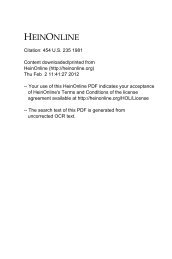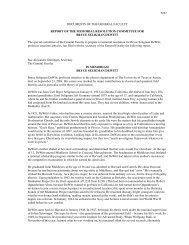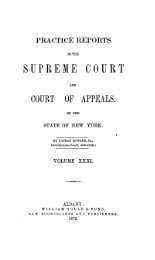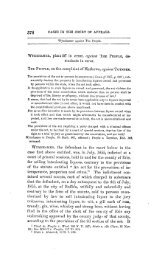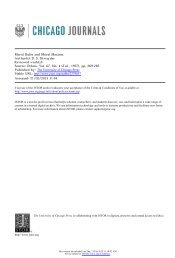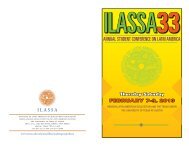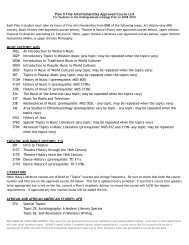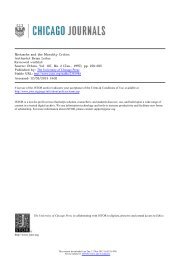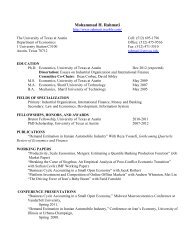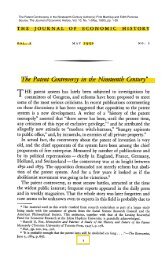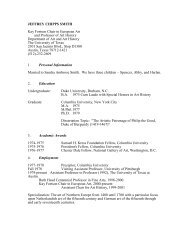The Educational Boundary. - The University of Texas at Austin
The Educational Boundary. - The University of Texas at Austin
The Educational Boundary. - The University of Texas at Austin
Create successful ePaper yourself
Turn your PDF publications into a flip-book with our unique Google optimized e-Paper software.
head <strong>of</strong> the educ<strong>at</strong>ion committee. Finally, Bob asked if an audit <strong>of</strong> the work <strong>of</strong> the training analyst hadbeen undertaken by the institute. <strong>The</strong> answer was th<strong>at</strong> it was never considered, but th<strong>at</strong> Bob's expulsionhad been.One informant added th<strong>at</strong> Bob had shown early in his candidacy th<strong>at</strong> he was a potential contributor tothe field, and th<strong>at</strong> several <strong>of</strong> the faculty members who had advoc<strong>at</strong>ed his expulsion resented or envied himfor his talents. Additionally, this informant said th<strong>at</strong> he believed th<strong>at</strong> certain members <strong>of</strong> the educ<strong>at</strong>ioncommittee had wanted to get rid <strong>of</strong> Bob's former training analyst, but in a complex group process hadprojected this desire on to Bob, and then turned against him for wh<strong>at</strong> they perceived as his <strong>at</strong>tack on theircolleague.Years passed, and once again Bob had a chance to talk about wh<strong>at</strong> had happened duringhis training with individuals who were <strong>at</strong> the time younger members <strong>of</strong> the educ<strong>at</strong>ion committee. By thistime both the former chair <strong>of</strong> the educ<strong>at</strong>ion committee and the former analyst had died. Perhaps becausethese individuals could no longer be affected by anything they said, these individuals told Bob th<strong>at</strong> in theirview the former educ<strong>at</strong>ion committee chair ran the institute as though it were his kingdom. <strong>The</strong>yconsistently recalled him as p<strong>at</strong>hologically narcissistic, arrogant, vindictive, and mean-spirited. <strong>The</strong>y alsoacknowledged th<strong>at</strong> there had been a widespread belief on the educ<strong>at</strong>ion committee th<strong>at</strong> Bob'sformer training analyst was impaired by his arrogance and rage <strong>at</strong> everyone around him, even his friendsand supporters.Discussion and Remedial SuggestionsIn our examples we have tried to illustr<strong>at</strong>e a few <strong>of</strong> the ways the educ<strong>at</strong>ion <strong>of</strong> candid<strong>at</strong>es iscompromised when the concept <strong>of</strong> the educ<strong>at</strong>ional boundary in psychoanalytic- 211 -training is misunderstood or not recognized <strong>at</strong> all. <strong>The</strong>se examples also <strong>at</strong>tempt to focus on the role <strong>of</strong>personal rel<strong>at</strong>ionships between and among members <strong>of</strong> the institute faculty, and the ways theserel<strong>at</strong>ionships affect the educ<strong>at</strong>ion <strong>of</strong> candid<strong>at</strong>es. Finally, we have noted the ways personal qualities such asp<strong>at</strong>hologicalnarcissism, vindictiveness, arrogance, and mean-spiritedness among faculty members comeinto play.In trying to understand the seemingly ubiquitous n<strong>at</strong>ure <strong>of</strong> institute abuses, we <strong>of</strong>fer an explan<strong>at</strong>ion.We are aware th<strong>at</strong> in analytic communities many <strong>of</strong> us experience regression much <strong>of</strong> the time. SinceFreud's first efforts <strong>at</strong> describing analytic technique, we have moved from the notion <strong>of</strong> the ‘objective’surgical practitioner to the emp<strong>at</strong>hic observer, and more recently to the very involved participant-observer.As the embrace <strong>of</strong> countertransference, freely hovering roleresponsiveness,countertransference enactment, and intense identific<strong>at</strong>ion and counteridentific<strong>at</strong>ion(mutual projective identific<strong>at</strong>ion) has moved us into a place <strong>of</strong> very close, prolonged identific<strong>at</strong>ion withour analysands, we experience st<strong>at</strong>es <strong>of</strong> intense regression more frequently and for longer periods <strong>of</strong> time.This leaves us both more emp<strong>at</strong>hically involved and more psychologically vulnerable than in earlierperiods in the history <strong>of</strong> psychoanalysis. <strong>The</strong>se vulnerable conditions and their acceptance in us, whilepotentially valuable when we are self-analyzing analysts effectively engaged in the therapeutic mission <strong>of</strong>analyzing and supervising, can represent a difficulty when we perform administr<strong>at</strong>ive and educ<strong>at</strong>ionalfunctions, because there we are not accustomed to working with our own intense emotions. Indeed, ourtolerance as analysts and analytic educ<strong>at</strong>ors for more prolonged regression makes clarity <strong>of</strong> thought muchharder when we function naively in the non-therapeutic educ<strong>at</strong>ional realm, where we must be aware <strong>of</strong> ourown difficulties with the regul<strong>at</strong>ion <strong>of</strong> narcissistic vulnerability, personal disappointment, envy orjealousy,intensely competitive feelings, and tendencies toward arrogance, vindictiveness, the desire for revenge,and mean-spiritedness.We wish to emphasize th<strong>at</strong> it is even more difficult than it might be for us to successfully negoti<strong>at</strong>ethese regressed st<strong>at</strong>es <strong>of</strong> mind and the existence <strong>of</strong> ourpersonality weaknesses because <strong>of</strong> the secrecyrequired by our pledge to maintain confidentiality. Were we analysts to routinely discuss witheach other our inner experiences with our analysands, and our colleagues, such consult<strong>at</strong>ion might resultin an enhanced awareness <strong>of</strong> wh<strong>at</strong> is going on inside our heads. But we keep our st<strong>at</strong>es <strong>of</strong> mind toourselves, in part because we are trained to contain wh<strong>at</strong> we hear and how we react to it, and in partbecause we are reluctant to reveal who we are and wh<strong>at</strong> we do to colleagues we do not fully trust. <strong>The</strong>result <strong>of</strong> this silence is th<strong>at</strong> we analysts, more than is necessary, are not fully able to recognize howregressed we <strong>of</strong>ten are in our analytic rel<strong>at</strong>ionships, and how th<strong>at</strong> st<strong>at</strong>e <strong>of</strong> regression may remain active,interfering with self-reflection, as we function as administr<strong>at</strong>ors and educ<strong>at</strong>ors.



